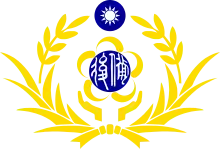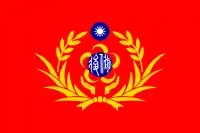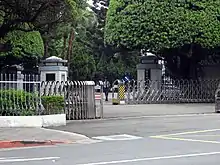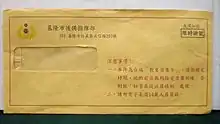Republic of China Armed Forces Reserve
The Armed Forces Reserve Command of Ministry of National Defense, is a division of the original "Reserve Command" adapted for the headquarters patterns, task planning and execution mobilization, management, service, civil defence, the establishment of the reserve potential. Provide each combat zone to carry out the first line of coastal defence and wartime operational areas required depth Reserve forces, and sustained implementation of the military mobilization, the use of the National defence mobilization mechanism, binding force after preparing to support ground operations, maintenance, Homeland Defence and Security Than in the past because of the number of troops, the reserve headquarters is now the main business is intensive recruitment, education convened training reserve forces, to defend the strategic implications of effective reserve.[1]
| Armed Forces Reserve Command, MND | |
|---|---|
| 國防部後備指揮部 | |
 Emblem of the Republic of China Armed Forces Reserve | |
| Founded | 1945 |
| Country | |
| Part of | Republic of China Armed Forces |
| Commanders | |
| Commander | |
| Deputy Commander | |
| Chief of staff | |
| Insignia | |
| Flag |  |
Overview
The Reserve Command has both peacetime and wartime responsibilities. During peacetime the Reserve Command manages the combined service reserve system, organizes and trains reserve units, recruits new talent, and prepares, certifies, and executes mobilization plans. The Reserve Command also assists the regular forces with humanitarian and disaster relief work. The Reserve Command’s primary wartime responsibility is providing mobilized reserve brigades to operational commanders. The secondary responsibility is effecting comprehensive national mobilization, which is made up of both military and civilian mobilization.[2]
The Reserve Command’s forces provide a critical second line of defense against a People’s Republic of China invasion.[3] The division of responsibilities between the regular and reserve forces is guided by the principle that in the event of wartime their missions will be “regular forces conducting strikes and the reserve forces defending the territory.”[1]
History


"Reserve Command" is a historical heritage bears military units. Thirty-four years since the Republic of China (1945) September 1 in Chongqing set up a "Taiwan Garrison General Headquarters' cases; the main task is responsible for Japanese emperor defeat repatriation in Taiwan and Japan prisoners, the reception of Taiwan and Taiwan maintain law and order issues.
- 1947, was ordered to be changed to " 'Taiwan province garrison headquarters by Peng Meng Ji served as commander in chief, and officially in Taipei office.
- In early 1949, the Taiwan Garrison General Headquarters of the province was renamed Taiwan Garrison General Headquarters' . " 1949 autumn, garrison headquarters ordered the abolition of Taiwan Province, namely the establishment of "Southeast Military Executive Office" and "Taiwan Security Command," Peng Meng Ji was appointed security commander.
- May 1958, in order to streamline the organization and unity of command, Army General Command business will be transferred to the garrison headquarters martial newly established, will "Taiwan's defense headquarters", "Taiwan Province Security Command "," civil defense headquarters four units in Taiwan Province "and" Xu Wei Taipei headquarters, "so as to" Taiwan Provincial Security Command "Merge compiled based on" Taiwan Garrison Command ", the former Commander in Chief of Xu Wei Taipei General 黃鎮球 as Taiwan garrison commander.
- July 1, 1964, to adjust the reserve military mobilization system, Defense Department abolition of Mobilization, New establishment military district headquarters in Taiwan, " ', Taiwan military district commander from Taiwan garrison commander concurrently, Secretary authorities have both high rank Sui Wei Taiwan Garrison Command, the Taiwan military district headquarters .
- 1977 "Jing'an the 1st" Project, military police Command former garrison headquarters in North Carolina knitting, central and southern three garrison battalions of military police battalion 239 ~ 241.
- August 1, 1992, in response to the 1992 Consensus, a reorganization of the military police, army, and marines occurred. The Taiwan military district headquarters - Coast Guard Command was formed to replace the originally police-led coast guard. The Coast Guard Command's roles include anti-smuggling, and immigration enforcement. On November 1, Taiwan military district headquarter was renamed to Military district headquarters. This unit is directly under the General Staff Headquarters, not belonging to the Armed Forces.
- 1999, because of the needs of port security, Military Police Battalions 224, and 241 were relocated.
- January 2000, the third reading "three methods of the Coast Guard", the same year on February 1 Japanese pipe, Coast Guard division. After Coast Guard was established, namely to command the full title " military district headquarters ." In history, the military garrison tube portion inherited historical headquarters since the Coast Guard is to be treated as a new Judicial Police units.
- March 1, 2002 with the National Defense Law of Taiwan implementation of full military control section title amended to Department of Defense Reserve Command , the regional "divisions tube section," counties "group tube unit "are amended to" Reserve Command. "
- January 1, 2006 Joint Logistics Department and stay around to your business stay business (center), demonstration Martyrs Cemetery Administration and Management Group shift compiled Reserve Command. February 15, all regions and all cities and counties "Reserve Command" amended to "reserve headquarters", "commander" was renamed the "commander."
- November 2008 in accordance with 精進案 plan, rank of commander was downgraded from full general to lieutenant general.
- 28 December 2012 in response to 精粹案, and with the Ministry of National Defense organizational changes, reducing the Armed Forces Reserve to the Department of Defense Reserve Command.[4] The recruit training center shift compiled Army reserve brigade; reserve brigade is shifting series Navy, set up Marines recruit training center. Reserve Command is responsible for recruit training and counseling services also was terminated in favor of the mobilization and reserve forces responsible for management of the main business.
Force structure
Reserve Command headquarters
- General Staff office: responsible for personnel, readiness, logistics, mobilization, planning, and funerary services.
- Political Warfare office: responsible for comprehensive political warfare, propaganda and psychological warfare, defense and security, and military awards.
- Inspection office: responsible for military discipline inspection, supervision and standards development, and legal affairs.
- Subordinate Units office: including as components the Department Guards Company, medical component, the Reserve Mobilization Management Academy, the National Heroes Cemetery Management Component, the National People’s Revolution Tomb of Unknowns Management Component, and the Funeral Services Section’s Tomb of the Unknowns Management Component.[2]
General Coordination Organizations of All-Out Defense Capabilities
The General Coordination Organizations of All-Out Defense Capabilities is a peacetime mechanism for coordinating reserve and total defense activities. It is organized at the city/county, combat zone, and national level.[5]
Equipment
Dual-use civilian assets in the reserve system include 10,000 properties, 2,000 pieces of heavy machinery, 300 fishing boats, 60 aircraft, and 50 ships.[2]
Regional reserve commands
- Northern Area Reserve Command
- Central Area Reserve Command
- Southern Area Reserve Command[2]
Flags
 Flag of the Commander Reserve Forces
Flag of the Commander Reserve Forces
References
- Taiwan Army, National Security and Defense Policy Handbook. Int'l Business Publications. 2009. ISBN 9781438747149.
- Mark Stokes, Cortez A. Cooper, Arthur Chan, Ian Easton (2017). Transformation of Taiwan's Reserve Force. Santa Monica, Calif.: RAND Corporation. ISBN 978-0-8330-9706-4.CS1 maint: multiple names: authors list (link)
- Asia, Print edition. "China's might is forcing Taiwan to rethink its military strategy". www.economist.com. The Economist. Retrieved 4 December 2019.
- "後備、憲兵指揮部編成 精銳國防力量" (Press release) (in Chinese). 青年日報. 29 December 2012.
- Brown, David G. (June 2020). "Reconceiving Taiwan's Reserve Forces" (PDF). Defense Security Review. 9 (1): 1–8. Retrieved 21 July 2020.
